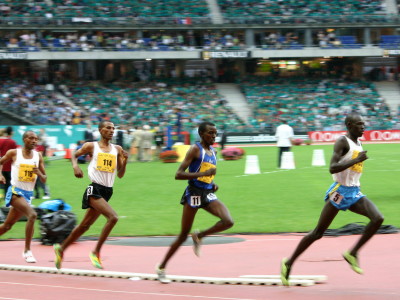The first mathematical model is created to calculate the ideal strategy for winning a short-distance horse race

Each racehorse has different speed, stamina, and cardiopulmonary ability. For centuries, jockeys and trainers have been planning based on experience, previous race data, and intuition on how to pace and reconcile in the race to win the race. .. However, a mathematician at the High School of Social Sciences (EHESS) in Paris has announced that he has created the first
Optimal speed in Thoroughbred horse racing
https://journals.plos.org/plosone/article?id=10.1371/journal.pone.0235024

The best way to win a horse race? Mathematicians may have the answer | Science | AAAS
EHESS mathematician Amandine Afterlion has been mathematically analyzing the running of athletes like Usain Bolt since 2013. As a result, we found that sprinters tend to start hard and win as they slowly slow down towards the finish line.
Afterlion, along with his colleague Quentin Mercier, installed a GPS tracker on the horse's saddle to obtain speed and position data for dozens of races at the Chantilly Racecourse. We have developed a model that explains the winning strategies for sprint races (1300m), middle-distance races (1900m), and slightly longer races (2100m). The model takes into account not only the difference in race distance, but also the slope and friction of the course and the curvature of the curve. According to the model of Mr. Afterlion and others, in sprint races, as with athletes' research, racehorses 'lead to a good finish with a strong start.'
If you apply the abilities of individual horses to the model, you can know the recommended pace and ideal race distance, Mr. Afterlion said, 'If there is demand, we may make such an app.' ..
However, Peter Knight, a veterinarian at the University of Sydney, who has been racing for more than 30 years, said that over the past 40 years, scientific attempts to evaluate horse racing performance have been unsuccessful, so 'this model is also a jockey and trainer. I think I can't win. ' The rationale is that when a horse in a race is overtaken, they may give up even though they haven't lost yet, but the mathematical model cannot measure the horse's heart. It's difficult to truly model performance until we can capture psychological variables, 'says Knight.
'For those who love horse racing, uncertainty brings excitement, and actually running a horse brings beauty and spectacle.' 'As a fundamental problem, we really do that. Do you want it? '

Related Posts:







